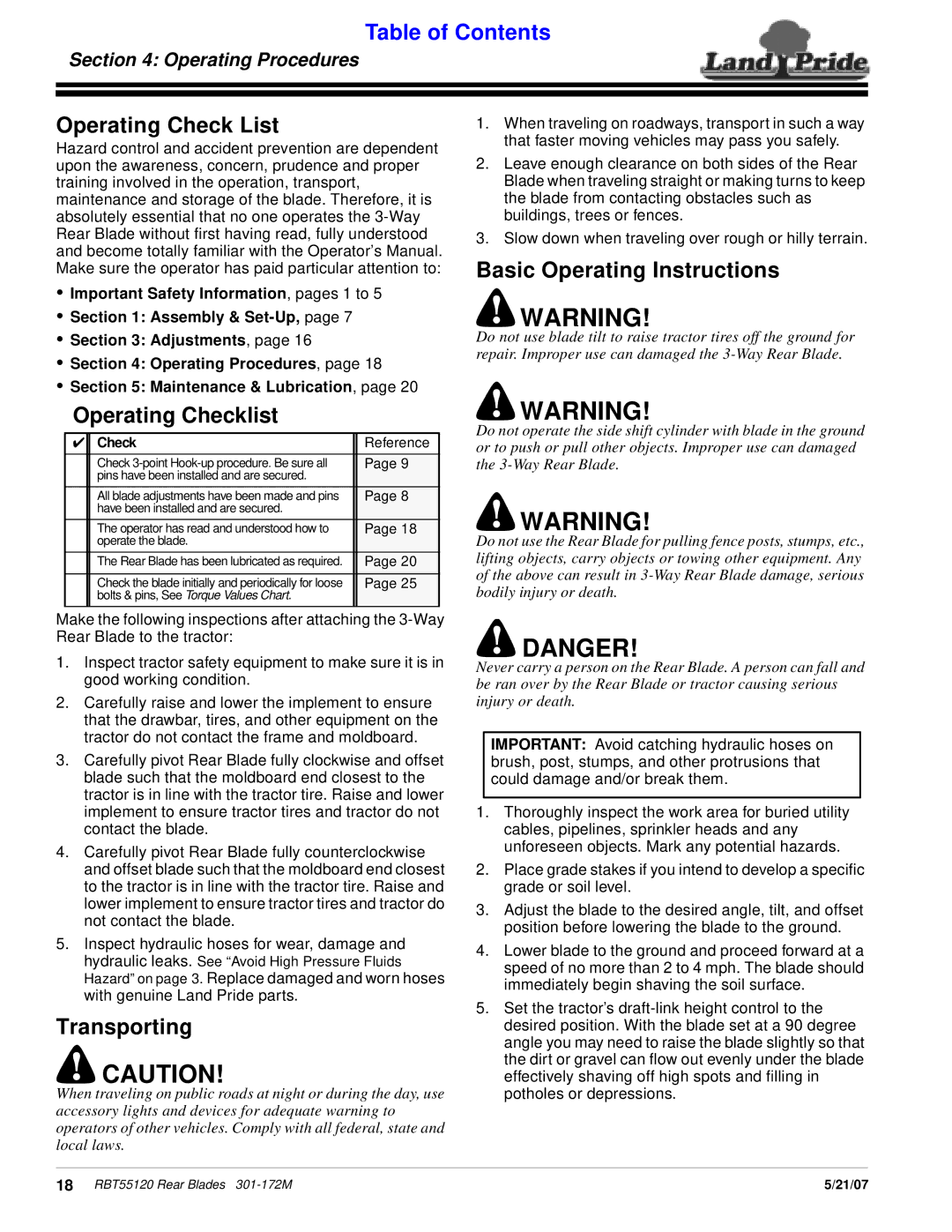
Table of Contents
Section 4: Operating Procedures
Land Pride
Operating Check List
Hazard control and accident prevention are dependent upon the awareness, concern, prudence and proper training involved in the operation, transport, maintenance and storage of the blade. Therefore, it is absolutely essential that no one operates the
•Important Safety Information, pages 1 to 5
•Section 1: Assembly &
•Section 3: Adjustments, page 16
•Section 4: Operating Procedures, page 18
•Section 5: Maintenance & Lubrication, page 20
Operating Checklist
✔ | Check | Reference |
|
|
|
| Check | Page 9 |
| pins have been installed and are secured. |
|
| All blade adjustments have been made and pins | Page 8 |
| have been installed and are secured. |
|
| The operator has read and understood how to | Page 18 |
| operate the blade. |
|
| The Rear Blade has been lubricated as required. | Page 20 |
| Check the blade initially and periodically for loose | Page 25 |
| bolts & pins, See Torque Values Chart. |
|
|
|
|
Make the following inspections after attaching the
1.Inspect tractor safety equipment to make sure it is in good working condition.
2.Carefully raise and lower the implement to ensure that the drawbar, tires, and other equipment on the tractor do not contact the frame and moldboard.
3.Carefully pivot Rear Blade fully clockwise and offset blade such that the moldboard end closest to the tractor is in line with the tractor tire. Raise and lower implement to ensure tractor tires and tractor do not contact the blade.
4.Carefully pivot Rear Blade fully counterclockwise and offset blade such that the moldboard end closest to the tractor is in line with the tractor tire. Raise and lower implement to ensure tractor tires and tractor do not contact the blade.
5.Inspect hydraulic hoses for wear, damage and hydraulic leaks. See “Avoid High Pressure Fluids Hazard” on page 3. Replace damaged and worn hoses with genuine Land Pride parts.
Transporting
!CAUTION!
When traveling on public roads at night or during the day, use accessory lights and devices for adequate warning to operators of other vehicles. Comply with all federal, state and local laws.
1.When traveling on roadways, transport in such a way that faster moving vehicles may pass you safely.
2.Leave enough clearance on both sides of the Rear Blade when traveling straight or making turns to keep the blade from contacting obstacles such as buildings, trees or fences.
3.Slow down when traveling over rough or hilly terrain.
Basic Operating Instructions
!WARNING!
Do not use blade tilt to raise tractor tires off the ground for repair. Improper use can damaged the
!WARNING!
Do not operate the side shift cylinder with blade in the ground or to push or pull other objects. Improper use can damaged the
!WARNING!
Do not use the Rear Blade for pulling fence posts, stumps, etc., lifting objects, carry objects or towing other equipment. Any of the above can result in
!DANGER!
Never carry a person on the Rear Blade. A person can fall and be ran over by the Rear Blade or tractor causing serious injury or death.
IMPORTANT: Avoid catching hydraulic hoses on brush, post, stumps, and other protrusions that could damage and/or break them.
1.Thoroughly inspect the work area for buried utility cables, pipelines, sprinkler heads and any unforeseen objects. Mark any potential hazards.
2.Place grade stakes if you intend to develop a specific grade or soil level.
3.Adjust the blade to the desired angle, tilt, and offset position before lowering the blade to the ground.
4.Lower blade to the ground and proceed forward at a speed of no more than 2 to 4 mph. The blade should immediately begin shaving the soil surface.
5.Set the tractor’s
18 RBT55120 Rear Blades | 5/21/07 |
